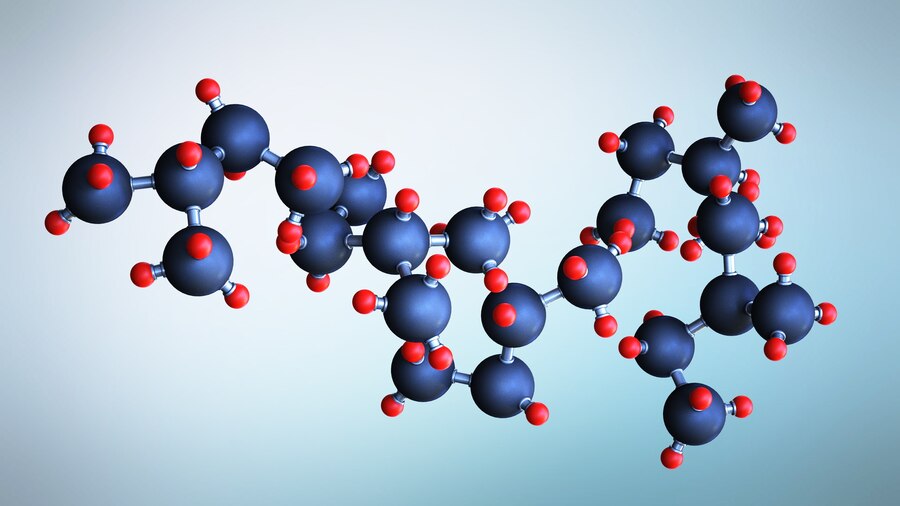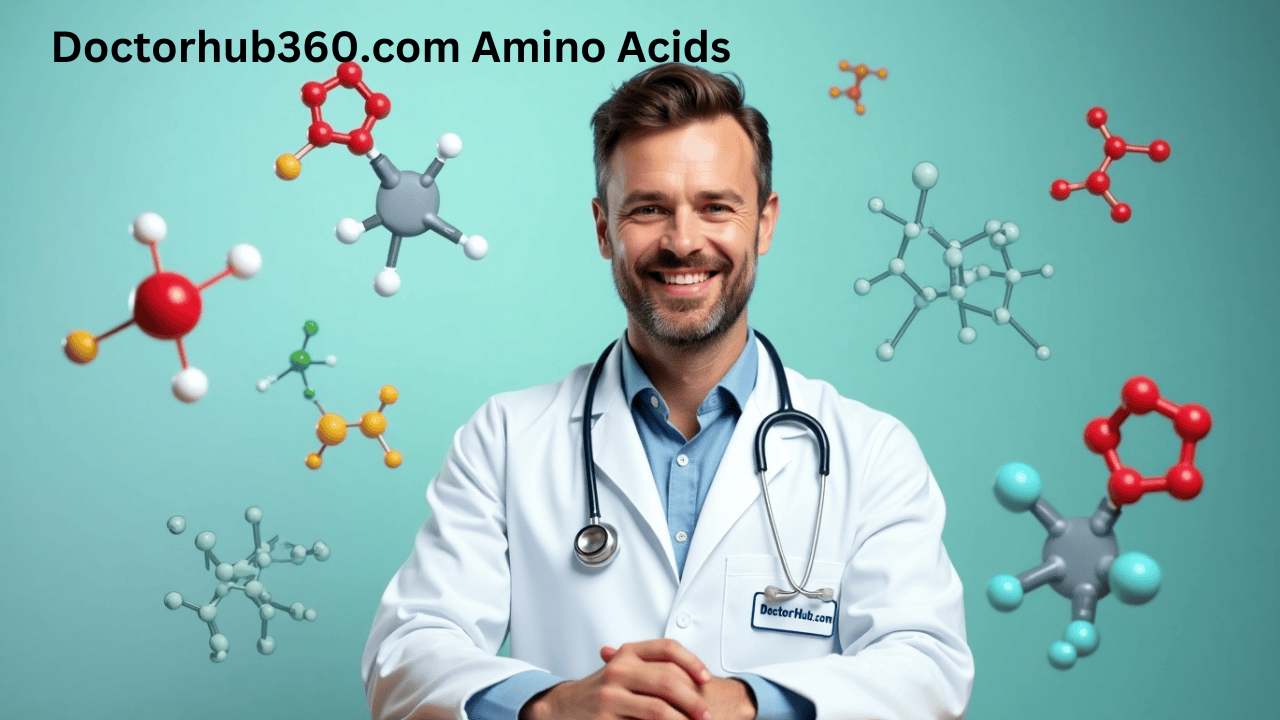Doctorhub360.com Amino acids are organic compounds that play a crucial role in various biological functions, including protein synthesis, metabolism, and cellular repair. These essential molecules serve as the foundation for proteins and enzymes, making them vital for overall health.
In this article, we will explore the different types of amino acids, their functions, sources, benefits, and much more.
What Are Doctorhub360.com Amino Acids?

Doctorhub360.com Amino acids are organic molecules composed of carbon, hydrogen, oxygen, and nitrogen. They serve as the structural units of proteins and are essential for various bodily functions, including muscle development, neurotransmission, and immune response.
Each amino acid consists of:
- An amino group (-NH₂)
- A carboxyl group (-COOH)
- A side chain (R-group) that determines its properties
Types of Doctorhub360.com Amino Acids

1. Essential Amino Acids
EssentialDoctorhub360.com amino acids cannot be synthesized by the human body and must be obtained through diet. There are nine essential amino acids:
- Histidine – Important for tissue repair and neurotransmitter function
- Isoleucine – Supports muscle metabolism and immune function
- Leucine – Plays a role in protein synthesis and muscle growth
- Lysine – Aids in calcium absorption and immune function
- Methionine – Crucial for metabolism and detoxification
- Phenylalanine – A precursor for neurotransmitters like dopamine and serotonin
- Threonine – Essential for protein structure and nervous system health
- Tryptophan – Helps in serotonin production and mood regulation
- Valine – Supports muscle growth and energy production
2. Non-Essential Amino Acids
Non-essential Doctorhub360.com amino acids can be produced by the body and are still important for various physiological processes. These include:
- Alanine – Supports glucose metabolism
- Arginine – Boosts immune function and hormone regulation
- Asparagine – Helps in nervous system function
- Aspartic Acid – Plays a role in energy production
- Cysteine – Supports detoxification and antioxidant production
- Glutamine – Crucial for gut health and immune support
- Glycine – Supports collagen production and brain function
- Proline – Important for skin and joint health
- Serine – Involved in brain function and metabolism
- Tyrosine – A precursor for dopamine and thyroid hormones
3. Conditional Amino Acids
These amino acids are usually non-essential but may become essential during periods of stress, illness, or injury. Examples include:
- Arginine
- Cysteine
- Glutamine
- Tyrosine
- Proline
- Serine
Functions of Doctorhub360.com Amino Acids in the Body
Amino acids play diverse roles in the body, including:
1. Protein Synthesis
Doctorhub360.com Amino acids are the fundamental building blocks of proteins, essential for muscle growth, tissue repair, and enzyme production.
2. Energy Production
Certain amino acids, such as leucine and isoleucine, can be broken down to provide energy when carbohydrates and fats are unavailable.
3. Neurotransmitter Production
Amino acids like tryptophan and tyrosine are precursors for neurotransmitters such as serotonin and dopamine, which regulate mood and cognitive function.
4. Immune System Support
Amino acids like glutamine and arginine enhance immune response, helping the body fight infections and recover from illness.
5. Detoxification and Antioxidant Production
Cysteine is involved in producing glutathione, a powerful antioxidant that helps detoxify the body and protect cells from damage.
Best Food Sources of Amino Acids
Amino acids are found in both plant-based and animal-based foods. Here are some of the best sources:
1. Animal-Based Sources
- Lean meats (chicken, beef, turkey)
- Fish (salmon, tuna, cod)
- Eggs
- Dairy products (milk, cheese, yogurt)
2. Plant-Based Sources
- Legumes (lentils, chickpeas, beans)
- Nuts and seeds (almonds, chia seeds, flaxseeds)
- Whole grains (quinoa, brown rice, oats)
- Soy products (tofu, tempeh, edamame)
Amino Acids and Muscle Growth
Amino acids, especially Branched-Chain Amino Acids (BCAAs)—leucine, isoleucine, and valine—are critical for muscle development. BCAAs help in:
- Enhancing protein synthesis
- Reducing muscle fatigue
- Preventing muscle breakdown
Many athletes and bodybuilders supplement with BCAAs to improve muscle recovery and performance.
Amino Acids and Mental Health
Certain amino acids significantly impact brain function and mental health:
- Tryptophan → Boosts serotonin production, improving mood and sleep
- Tyrosine → Precursor to dopamine, enhancing focus and motivation
- Glutamine → Supports cognitive function and reduces brain fog
Amino Acid Deficiency: Signs and Symptoms
A deficiency in amino acids can lead to various health issues, including:
- Muscle loss and weakness
- Fatigue and low energy levels
- Weakened immune function
- Mood swings and depression
- Poor skin, hair, and nail health
Amino Acid Supplements: Are They Necessary?
Amino acid supplements, such as BCAAs and essential amino acid powders, can benefit:
- Athletes and bodybuilders
- Vegetarians and vegans with low protein intake
- People recovering from illness or surgery
However, it is always best to obtain amino acids from natural food sources whenever possible.
FAQs About Amino Acids
1. What are the best Doctorhub360.com amino acids for muscle growth?
Leucine, isoleucine, and valine (BCAAs) are the best amino acids for muscle growth, as they enhance protein synthesis and prevent muscle breakdown.
2. Can you get all essential amino acids from a vegetarian diet?
Yes, but vegetarians must consume a variety of plant-based proteins, such as lentils, quinoa, and soy products, to obtain all essential amino acids.
3. Are Doctorhub360.com amino acid supplements safe?
Yes, when taken in appropriate amounts. However, excessive intake may cause digestive issues or kidney strain.
4. Do Doctorhub360.com amino acids help with weight loss?
Some amino acids, like leucine and arginine, can support fat loss by boosting metabolism and preserving muscle mass.
5. How much protein should I consume daily to get enough amino acids?
The recommended daily protein intake varies based on age, gender, and activity level, but an average adult should aim for 0.8 grams per kilogram of body weight.
Conclusion
Amino acids are essential for overall health, influencing everything from muscle growth to mental well-being. Ensuring a balanced diet with adequate protein intake can help maintain optimal amino acid levels. Whether through natural food sources or supplements, consuming the right amino acids can significantly enhance your health and performance.










